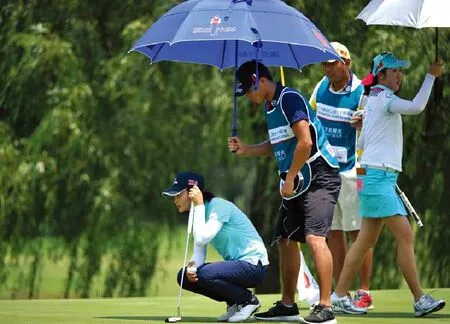COURSE CORRECTION
BY CARLOS OTTERY
COURSE CORRECTION
BY CARLOS OTTERY
富人的运动,腐败的温床?
高尔夫球在中国的坎坷经历
Of the many things the Chinese claim to have invented, and the list is extensive, golf is one of the more surprising ones. But, it’s not an unreasonable claim. Chuiwan (锤丸, lit. hitting ball)has been documented in China since at least the 15th century, and there are even paintings of the Ming Dynasty (1368 - 1644)Xuande Emperor (宣德皇帝) playing the game. The paintings show colourful clothes, sticks of different sizes, flags over holes, and what appear to be assistants helping the ball hitters play the game. Sound familiar? There are even some written descriptions of what appear to be the same game going back even further,to the 11th century. Such documents have been enough for some scholars to say,yes, golf originated in China. Others have gone so far to suggest, specifically, that it was Mongol invaders who came to Europe eventually introducing the game into Scotland. A pre-cursor to golf or not, chuiwan was played in China well into the Qing Dynasty (1616 - 1911).
Ancient origins aside, when golf proper was introduced into China in the 20th century it was done so under the auspices of being a Western game, and in the first half of the century it was a practice almost entirely confined to a small number of Westerners living in foreign concessions, mainly in Shanghai. Indeed, the Shanghai Zoo is said to have been built over one such course. On coming to power in 1949, Chairman Mao, eager to end decadent and bourgeois Western practices, dubbed it a “sport for millionaires” and, naturally, banned golf, making sure China’s few courses were filled in. It was viewed as a wealthyman’s game, played by people of questionable morals—so much so that for a while it was colloquially dubbed“green opium”; whether this negated or added to its allure is unclear, but from the Mao years right up to the economic reforms of the 1980s, golf in China was largely forgotten.

The pGA Tour China-Cadillac Championship of 2014 where Chen Zihao came in second
Mao’s death changed much in China though, and new leader Deng Xiaoping fast set about reforms to see foreign investment in China, and one such way to encourage investment was golf. So the nation set about golf with considerable gusto. For a while China seemed to be going golf mad. Between 1984 and 2005, China built about 200 golf courses—a considerable pace given most of the country had no idea what golf was. From 2005 to 2010, China went into golf overdrive,trebling the number of its courses to a peak of over 600.
Spencer Robinson is the Chief Communications Officer for the Asian Golf Industry Federation and has closely followed Chinese golf as a journalist for over 30 years. “There was a time, probably going back to the late 90s, when a lot of the golf industry was looking to move their offices to China, some did in fact,” he says.“From about 1984 onward, golf in China was growing rapidly and things weren’t happening for golf outside of China. They had opened about 200 courses here, and people were getting carried away. There were estimates of 2,000 courses being built and there being 20 million players. I even wrote some over-hyped stuff myself.”
Despite this golf boom, the legalities of the golf industry in China are somewhat murky. As a case in point,a 2013 and well-received book on the subject by Dan Washburn was titled, The Forbidden Game: Golf and the Chinese Dream. Since the mid-1990s,and up until just last month, various government reports and edicts havebeen published by the government that seem to suggest golf is suddenly banned, then legal, then banned again, or at the very least controlled and tightly regulated. So much so,that it seems difficult to get a definitive answer on whether it is legal or not. Such flip-flopping causes considerable insecurity for golf course developers and tests the nerves of golf industry administrators.
Chinese officials trying not quell the rise of Chinese golf is not particularly new. In 1995, in an effort to control what was believed to be an emergent real estate bubble, China issued a State Council circular, stating that“new golf courses, replica ancient cities, and amusement parks” were to be forbidden—it didn’t seem to work. On January 10, 2004, the General Office for the State Council published a lengthy edict specifically banning the building of any new golf courses. Citing excessive building,the requisition of rural land, and the surreptitious building of golf courses by property developers, it stated that no new golf course should be built,those currently being built should be suspended, and that supervision,inspection, and guidance should be strengthened for current golf courses already open. In a communist country,the sport’s elitist reputation does not help either. You only have to look at the game’s global sponsors (Rolex,Mercedes, BMW, HSBC) to see that golf is targeted at a particular type of person.
Despite such bans, Simon Leach who works for the European Tour of the Professional Golf Association (PGA),as their Director of China, believes the government’s position on golf should not necessarily worry those in the industry too much.
“Golf is in its first stage in China, so there have been difficulties. Recently lots of elite courses opened fast, maybe too fast. There were lots of reports about courses not being ecological,being built illegally, elitism, and land grabbing,” he says. “Over the last 12 months the government have been monitoring it very closely. To check everything is being done properly, and now they have looked into that, they are letting golf to develop again. The government are absolutely right to do what they have done.” The cynical might argue that as someone who works in the golf industry, Leach has to sugar-coat what is going in Chinese golf, that he needs to believe that it is going to survive and is going from strength to strength.

The CTBC Shanghai Ladies Classic in 2015, held at the Shanghai Tianma Golf Club
But he argues that it is his experience on the ground that shows him thatgolf is in a good place. “A few people in England were nervous at what was happening, but I have been here for ten years; I know how things work here and that things aren’t always what they seem,” he says. “The government is realizing it is a growth industry, so they are going to let the brands support it. It is different, to snooker, which is popular amongst all social groups, so they can just tell state opened companies to sponsor. In golf it will come from the large brands.”

The 2004 ban was not the last government attack on golf. President Xi Jinping’s leadership, with its attendant anti-corruption drive, has seen golf come under the spotlight once again. Expensive golf club memberships are believed to often be given as bribes (I was told of one course in China that has full membership fees of two million RMB), and it is a sport where shady deals are believed to be made out on the “19th hole”. Many regular golfers have argued that such a reputation is unfair, but it is one that persists nevertheless. And,under the current administration, a reputation for corruption, real or imagined, is about the worst thing you can have. And so it was that in April 2015, the government announced that 66 golf courses would be closed outright—that’s over ten percent of the nation’s total. Just six months later in September, a complete ban was announced on all Party officials joining golf clubs. Specifically, the ban was for “obtaining, holding,or using membership cards for gyms, clubs golf clubs,or various other types of consumer cards, or entering private clubs.” Aside from closing down golf courses,officials that were believed to have accepted golf gifts or engaged in corruption on the golf course were cracked down upon. One such official was Wang Shenyang, the director of Outward Investment and Economic Co-operation at the Ministry of Commerce,who was removed from his position for playing golf using public money. A lawmaker in Shenzhen (home to the biggest golf complex in the world), Han Jian was charged with accepting six million RMB in bribes in 2013, almost a third of the total was made up in golf memberships. Many others followed.
The question as to why, if China has effectively explicitly banned the building of new golf courses since 2004, the country was able to build hundreds of golf courses is a complex one and requires at a least residual understanding of Chinese politics. A popular saying that is often invoked when trying to understand such discrepancies is, “Heaven is high and emperor is far away,” an idiom regularly used to explain that while the Chinese central government maintains huge power, it is often difficult for it to have firm control of what happens with provincial governments many hundreds of miles away from Beijing; the central government certainly do not appear to have much control when it comes to stopping the relentless march of golf.
Illegal land deals are a problem too. With around 20 percent of the world’s population, but only eight percent of the world’s arable land, land use is always likely to be a contentious issue in China. Thousands of wealthy men dressed in lime-green spandex whacking a ball around very large tracts of land(sometimes what was previously farmland) with large metal sticks is always likely to raise a few eyebrows,particularly given the heavy water requirements and China’s ongoing struggles with water shortages. Nevertheless, for the last two decades at least,provincial governments have often overlooked land scarcity and taken large portions of their revenues from the “sale” and lease of land. Such land is often bought by property companies at bargain prices and then developed at considerable profit, often in the guise of golf courses, though they are not necessarily called golf courses, instead often branded as health facilities,international competition areas,creative industries, sustainable living parks, and almost any title imaginable as long as it doesn’t include the word golf. In his book, Washburn writes about a huge 22-course golf megacomplex on the island of Hainan. Under its development it was simply titled the “Yangshan District Land Consolidation and Ecological Project”.
“Yes, the government has cracked down, but wherever people see an opportunity for money to be made they exploit loopholes. People would say,‘we were just building a big green park with a few sand bunkers’, but people aren’t stupid,” says Robinson. “Going back ten, 20 years there were definitely problems, particularly with ecology. There was huge abuse. Mountains were damaged. There was no real clue what pesticides were being used. It was bad,but I think it has changed. People are just a lot more aware of environmental protection. The government shut down a lot of the worst abusers. Actually, golf courses have a fantastic place to act as lungs for a city, especially with all these polluted cities. They can be a place for people to get out and breathe.”
In recent months though, Beijing seems to have softened its stance on golf courses and golf memberships. In April 2016, an article in the Discipline Inspection and Supervision News, the official’s newspaper of China’s anticorruption agency stated that, “Since it is only a sport, there is no right or wrong with regards to playing golf.”The article goes on to reference article 87 of the Chinese Communist Party Disciplinary Regulations:
“Where relevant provisions are violated to obtain, possess, or make actual use of sports or fitness cards,venue or club memberships, golfing cards and other consumer cards;or where relevant provisions are violated to access to private venues,and the circumstances are more serious, a punishment or a warning or a serious warning are given;where the circumstances are serious,a punishment of a removal from internal Party posts or Party probation is given.”
The state-newspaper China Daily summed up the position more succinctly: “Can officials play golf while the nation steps up efforts to clamp down on corruption and promote austerity? The answer is yes—if they pay out of their own pockets.”
If the government has done a U-turn on the status of golf, then it is not entirely clear why. One factor that is bound to have played a part is that golf is about to be reintroduced into the Olympics for the first time in over 100 years.
“I heard the news last month that they are easing up and it is a good sign. Golf being re-admitted to the Olympic Games is a big thing. China always grabs any chance it has to grab national glory, so it makes sense the government are more supportive. It is a positive outlook,” says Robinson.“I just hope that the government and the China Golf Association develops at a sensible rate. It needs to be taken into schools. We need tight controls for permits. This will take away the insecurities of a lot of people involved. So that developers know what they have to do.”
The instability of golf in China causes more difficulties for one group of people than any other: golfers. If the reputation of the sport keeps suffering, people are not sure if they can play, and if there is a lack of public courses then it is going to be difficult for China to provide elite players. In 2012, Shanshan Feng (冯珊珊) became the first Chinese player to win a golf major, and she has been in and around the world’s top five rankings ever since. There are two male players in the top 100, but other than that pickings have been slim, but things are expected in the next decade or so.
“There are a lot of people in their teens that have been taken to the US to enter tournaments. They have wealthy parents that are willing to back them. The real hope is that these teens will really make an impact on the game,” says Robinson.“I think less than a decade from now China will have half a dozen in the top 50 or so. If the cut was made today, there would be two players who would make it into the Olympics, so hopefully they can make stay there, as it will give the sport a lot of limelight.”
Most think that a true Chinese golf superstar for the game could only be a good thing, but others worry that it might not be best for the game if it happens too fast. “It’s hard to say really. I don’t think it should come too early. We need to have everything in place. The courses, the facilities, the tournaments,” says Leach. “When that happens, then a golf superstar will be the icing on the cake.”
It’s been 30 years of stop-start growth, but golf in China is still in its infancy: regulations are unclear, the sport hasn’t been taken into schools,and courses are available to the elite,but less so the public, but if China,in an Olympic year, is able to address these issues, then its star in China may shine very bright indeed. More than that, China might just become the game’s global savior.

